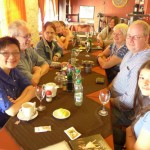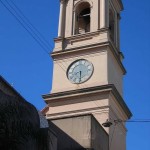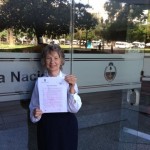More on Planting Flags
As you know our focus and our goal is to reinstate, in our own lives, good old American independence and innovation. We also seek to support caring relationships with our neighbors and our community—which we think was an important quality of the environment that we once knew and that we would like to reproduce, wherever we are.
This writer is old enough to remember the later period of World War II. Our neighbors often gathered on our front porch, drinking sweet ice tea and discussing politics. Discussions about politics were not frowned on. At least not in our neighborhood. Some of the discussions became intense at times, but it didn’t stop us from being caring neighbors. And people were always polite. You never heard a swear word in polite company.
Occasionally when everyone was there on Grandma’s porch, the news would come on the radio. Conversation ceased. Everyone went into the living room, dragged up a chair around my grandmother’s big, old, floor-model radio, to hear the news of the war.
In our neighborhood during that period and for years after, neighbors were the next thing to family. We knew each other well and were in and out of each other’s homes often. No one I knew had health insurance, though you could go to the county hospital for treatment if you had no money. Medical care was affordable. Doctors even treated patients for free or for reduced fees if necessary. And they made house calls. Just one more example of the community spirit that was alive and well.
However, there were people who did well during the depression. For example, many people could no longer afford to drive and so the bus company did very well. Transportation employees never felt the depression. And there were others who prospered during that time.
Few people were on medication, compared to today. They lived long lives anyway and the health of Americans rated much higher on international surveys than it does today. Most of us know that Americans are a sick lot.
Our people were proud then of their independence and you had to be pretty desperate to go on “public assistance,” as they called it. In fact, I never knew anyone as a child, who would admit to it, though some did brag that no one in their family had ever been on it. America was in a depression. Families helped each other, and churches helped families in crisis. In my family, all three of my grandparents’ boys moved their families back to my grandparents’ home. They planted the back yard in garden and fruit trees, built a chicken house for chickens, and this was in the middle of Miami–not the country. Family members who could find work, did, and pooled resources. They built an extra bedroom and two porches on the house to make room for everyone. They used the resources available to them. It was not an easy time, but they came through it just fine and lived full lives afterward.
People scorned the idea of debt. They cut spending nearly to zero. They did customarily have mortgages—which were paid off in 15 years, incidentally. Our neighborhood was considered middle class, but no one we knew of aspired to grand dwellings. We all had clean, comfortable homes, well-kept lawns and streets. The era of the McMansion did not arrive until decades later.
We think that all that government assistance in later years damaged our sense of community because people no longer felt responsible for each other after Uncle Sam took that responsibility. Dependence on the government had arrived!
Part of our focus is to recapture that caring independence and freedom and sense of community. Here is where the aforementioned Yankee innovation comes in. We think, with a bankrupt government, much of the federal support that we have come to expect might be reduced or eliminated. Some of the states have already cut back some services, and there are reoccurring suggestions that Social Security and Medicare must be cut. So now is the time to plan ahead. Things have changed on the political and international scene, for now, and so we innovate. And we plant flags. If the current global downturn is short-lived, which we hope it will be, then nothing is lost. But if it isn’t that short, we will be glad we took action. We thought we would deal with the flag planting concept once more before we move on because the benefit is being so graphically impressed on us here in Argentina.
As stated in previous articles, a retiree with little or no assets will not have the same interest in flag planting, although we think that a second passport and a way to supplement income are considerations for retirees as well. What do you think?
Flag planters try to hold at least two passports. They often (but not always) like to be self-employed because it is one route to independence. When you create your own job, you aren’t dependent on an employer to give you a job, and the business can support you in retirement or you can sell it. Try selling that pink slip when an employer hands it to you.
Flag planters with middle class assets normally bank in yet another country than the one where they live or do business and sometimes they diversify into more than one bank. The wisdom of this theory is being played out in Argentina right now as the country has entered a debt crisis—again. The government has put currency controls in place in an attempt to counter that crisis. A more in depth account of the Argentina situation is here. With a citizenship in Spain, for example, and a bank account in Belize, an Argentine is as free now as he ever was whereas some Argentines who want to leave cannot because they do not have access to their money.
For now we focus on personal independence and on our community. We try to support family-operated business in our neighborhood rather than the corporation in France, where our major supermarket is based, and certainly our neighbors, in return, help us with good products and service, along with their friendly smiles and sometimes–after all, this is South America–their kisses. Have you ever been kissed by your grocer?
Well, as our readers know by now, they put their cheek next to yours and they kiss the air. The tour guide we described from the articles on Uruguay (here) has lived in the United States as a student and said that, while she loves the U.S., she missed the hugs and kisses of Uruguay and always felt disappointed with the coolness of the handshake. It’s a difference in cultures, of course and we also appreciate the warmth of the Latin Americans.
In conclusion, planting flags is really about freedom, independence and remaining sovereign rather than dependent. We are interested in your innovative ideas as well. Feel free to contact us at info@fourflagsjournal.com. Make yourselves at home. This is a community too! Just consider it the electronic version of my grandma’s front porch.
Until next week when we look forward to seeing you again . . . .
Arlean
Copyright © 2012 Four Flags Journal, All rights reserved.





Arlean,
Great post — probably your best yet.
It’s such a shame that traditional American values are not as widespread in America as they once were. With any luck, on November 6 we can at least slow their demise.
Best Regards,
Rich
From NH (The “Live Free or Die” state.)
Thanks so much, Rich. And I’m really excited that you will soon be headed south.
Hello Arleen,
I continue to enjoy your posting. Yours are pretty similar to that of the Sovereign Man-an America expat based in Chile.
I’m not a retiree yet,and I don’t have significant amount of liquid assets.
I do, however, find the need to relocate for the same reasons you stated above-the seemingly eminent collapse of western economies and the potential violent effect that it could caused on civilian population (specially those of us living in big cities). I’m interested in organic farming. Uruguay seems like a good place for starting a new life as an organic farmer.
I’m a lisenced clinical nutritionist. In the past year I have been volunteering my time at farms in upstate, NY, Massachusetts, and the Canary Islands.
I would like to know your thoughts on this subject (organic farming) and the cost of land. I’m also planning my first visit to Uruguay in December (a week before Christmas) as I know that after that date prices for most everything skyrocket.
I look forward to your response.
Jorge.
Hi Jorge and thanks for your comment and your kindness. Yes Uruguay is a great place for farming and I see you have already gotten some experience. That’s fantastic. Also that you are a licensed nutritionist. I think we need you down here! ;D If you go to the web site and look under Uruguay you will see several articles about farms and agriculture in Uruguay. You might find answers there, particularly in the one about the CONEAT system. Maybe we’ll get to meet you in person when you get to Uruguay!